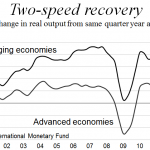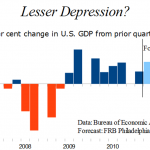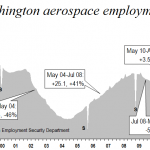Now you know. It is all right there on the front page of today’s New York Times, and in fewer than 300 words in this edited excerpt: Workers are getting more expensive while equipment is getting cheaper, and the combination is encouraging companies to spend on machines rather than people. [continue reading . . . ]
I posted the following April 25 2011 Will the bond market tank when the Fed stops buying Treasury paper in a few weeks? As reported in today’s Wall Street Journal, two of the biggest players in the fixed-income market are at polar opposites. They both can’t be right. As I [continue reading . . . ]
I drove to Portland from Seattle starting at mid-day Friday and so saw first hand the mess that is northbound I-5 in the Rose City at afternoon rush. Bumper-to-bumper traffic crawled between Portland’s Rose Quarter, across the Willamette River from downtown, and the Columbia River bridge (aka the Interstate Bridge) [continue reading . . . ]

It has been nearly four years since the collapse of two Bear Stearns hedge funds (June 2007) signaled the start of the global financial crisis, not quite three since the failure of Lehman Brothers Holdings (Sept. 14, 2008) sent banks into a panic and pushed the tottering global economy off [continue reading . . . ]
On KUOW’s Weekday talk program today, Steve Scher, the host, asked if I had any ideas about the “Lesser Depression” I was talking about. I think I have a decent radio voice, but I’m slow on my feet, not nimble. I stalled for time, then mumbled something about Paul Ryan’s [continue reading . . . ]
I’m still receiving a free copy of China Daily USA on Fridays, bundled with my subscription copy of The New York Times. I wrote about this earlier here. This week’s issue tells you all you need to know about the journalistic standards of the official newspaper of the People’s Republic [continue reading . . . ]
Is Microsoft CEO a Charlie Brown, tumbling embarrassingly into a heap as Lucy repeatedly snatches the football away at the last minute. Hedge-fund manager David Einhorn of Greenlight Capital, famous for spotting trouble early at Lehman Brothers Holdings, thanks so. Einhorn, whose fund owns 9 million Microsoft shares, told the [continue reading . . . ]

Alaska’s stranded North Slope natural gas looks to remain stranded. The more important trend for the short term, both for Alaska and for the Puget Sound area, especially Tacoma, is that oil production continues to decline. No one who’s been paying attention to natural-gas developments was surprised that BP and [continue reading . . . ]

What to call the period that arguably began in 2006 when the rich world’s housing market peaked? The Financial Times (FT) in a Lex column May 13 uses a term I have not seen before: “Lesser Depression.” The U.S. economy typically rebounds strongly following a recession. The 1974-75 and 1981-82 [continue reading . . . ]

The news that Boeing will add 1,200 employees at Renton, south of Seattle, amounts to a significant plus for the Puget Sound Metropolitan area. It is another sign that Boeing has rediscovered the worth its Washington-based work force, even as it is on the cusp of starting up a Dreamliner [continue reading . . . ]
Facebook worth $76 billion, more than Boeing ($57.9 billion) or Ford ($57.8 billion)? LinkedIn, a Facebook for professionals, worth $3.3 billion, 200 times 2010 profit? Microsoft pays 400 times operating profit for Skype, where only a tiny minority of registered users pay anything. What’s wrong with this picture? Does this [continue reading . . . ]
Seattle is shaped like an hour glass, with salt water (Puget Sound) pushing in from the west, fresh water (Lake Washington) from the east. The jewel on Puget Sound has two principal north-south arteries through the narrowest part. One, an elevated double-decker built in the 1950s that walls the vibrant [continue reading . . . ]